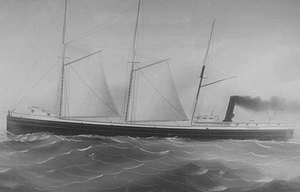John M. Osborn (steamboat)

John M. Osborn under sail.
|
|
| History | |
|---|---|
| Name: | John M. Osborn |
| Owner: | George F. Cleveland and the Cleveland Iron Mining Company |
| Port of registry: | Detroit, Michigan |
| Builder: | Morley & Hill of Marine City, Michigan |
| Completed: | 1882 |
| Fate: | Sank in Whitefish Bay 27 July 1884 after she was rammed by the Alberta |
| Notes: | United States Registry # 76307 |
| General characteristics | |
| Class and type: | Propeller, wooden steam barge |
| Tonnage: |
891.02 Gross Register Tonnage 710.95 Net Register Tonnage |
| Length: | 178 ft (54 m) |
| Beam: | 32 ft (9.8 m) |
| Depth: | 14 ft (4.3 m) |
| Propulsion: | Propeller |
891.02 Gross Register Tonnage
The John M Osborn was a wooden steam barge that sank in Lake Superior in 1884 with the loss of five lives. The Osborn was just 2 years old when the larger, steel-hulled Alberta, which was called a “steel monster" and "terror of the lakes", rammed her. The wreck of the Osborn was discovered 100 years after her sinking. The wreck was illegally salvaged in the 1980s. Many of Osborn’s artifacts became the property of the State of Michigan after they were seized from Great Lakes Shipwreck Museum. The State allows the museum to display the artifacts as a loan. The wreck of the Osborn is now protected by the Whitefish Point Underwater Preserve as part of an underwater museum.
The John M. Osborn was a propeller wooden steam barge built in 1882 by Morley and Hill in Marine City, Michigan. She rebuilt in 1884 in Cleveland, Ohio for increased tonnage. She was owned by George F. Cleveland and the Cleveland Mining Ore Company.
Captain Thomas Wilford’s wife Fannie and his two daughters, Cora and Adelaide were on board the Osborn on her final day of 27 July 1884. They enjoyed a sunny day walking the deck, attending Sunday school services, and talking to the sailors, including the mate, George F. Cleveland, who also owned the Osborn. The children were to put to bed as night fell and a thick fog developed. Mrs. Fannie Wilford was uneasy and stayed near her husband’s side on deck near the bow.
The wooden Osborn was downbound for the Soo Locks with a cargo of 1,120 tons of iron ore and towing two schooner barges, the George W. Davis and the Thomas Gawn. The Alberta was upbound with her usual amount of passengers and freight on her regular run between Owen Sound, Ontario and Port Arthur, Ontario. The Osborn carefully whistled her approach through the fog but one ship whistled once for a starboard course and the other ship whistled twice for a port course. Shipwreck historian Frederick Stonehouse wrote:
...
Wikipedia
